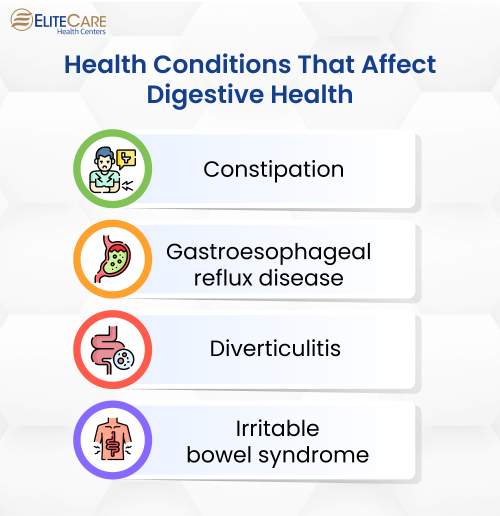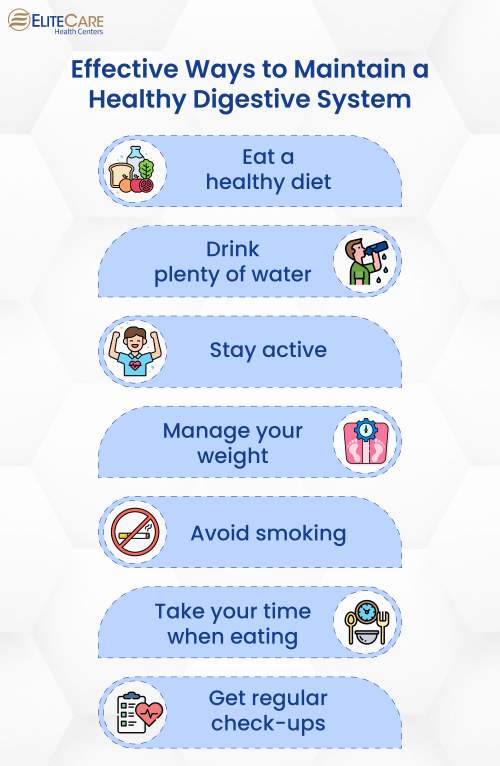
A healthy life starts with a balanced diet and good digestive health. Younger people tend to have stronger digestive systems, but as the body ages, this key system may lose efficiency. According to the National Institute of Diabetes and Digestive and Kidney Diseases (NIDDK), about 60 to 70 million Americans are affected by digestive diseases.
Read on to know about the common digestive health issues that can develop with age and what seniors can do to prevent them from happening.
Aging and Digestive Health Changes

1. Constipation
With age, the muscles that help move food through the digestive system, including the colon, can become weaker and less efficient. This causes stool to move more slowly through the colon and ultimately leads to constipation.
In addition, seniors can suffer from constipation if they consume less fiber or fluids, both of which are essential for healthy bowel movements. The common symptoms of constipation include infrequent bowel motions, hard, dry stool, and difficult or painful bowel movements.
Read More: Can Certain Food Improve Your Brain Health?
2. Gastroesophageal reflux disease
A persistent digestive illness called gastroesophageal reflux disease (GERD) is brought on when stomach acid or bile rushes back up into the esophagus, therefore, irritating and inflaming it. Heartburn, swallowing difficulties, chest pain, sore throat, and nausea or vomiting are the most common signs of GERD.
3. Diverticulitis
This condition primarily affects adults aged 60 years or older. Diverticulitis is a disorder that develops when the colon’s lining develops tiny pouches called diverticula and they become infected or inflamed. Some people may experience abdominal pain, fever, changes in bowel habits, or bloating. Although, the actual cause of diverticulitis is unknown, however, several factors can contribute to its development, including aging, genetics, obesity, smoking and stress.
4. Irritable bowel syndrome (IBS)
IBS stands for irritable bowel syndrome, which is a common disorder of the digestive system that affects the large intestine. It is a chronic condition that is characterized by a group of symptoms, including abdominal pain, cramping, bloating, gas, constipation, and diarrhea.
5. Inactivity
Staying inactive for a long period of time can contribute to digestive problems, particularly constipation, acid reflux, and bloating. Inactivity or low levels of physical activity may disrupt the way the digestive tract muscles move food and waste through the system. This could slow down digestion and increase the risk of constipation.
Effective Ways to Maintain a Healthy Digestion System for Seniors

1. Eat a healthy diet
Foods high in fiber and nutrients and low in fat make up a diet that provides the nutrients required for a healthy digestive tract.
The following are some foods that can help seniors maintain a healthy digestive system:
- Fiber-rich foods: Whole grains, fruits, vegetables, beans, lentils, etc.
- Probiotic-rich foods: Yogurt, kefir, sauerkraut, kimchi, tempeh, etc.
- Water-rich foods: Watermelon, cucumber, tomatoes, leafy greens, etc.
- Lean proteins: Chicken, fish, beans, etc.
- Foods high in vitamin C Oranges, kiwis, strawberries, bell peppers, etc.
- Healthy fats: Avocados, nuts, olive oil, etc.
Seniors should talk to their healthcare provider or a registered dietitian before making any significant changes to their diet. They can help ensure that their diet is balanced and meets their unique nutritional needs.
2. Drink plenty of water
One of the most effective ways to maintain a healthy digestive system is to drink adequate water. Adequate hydration prevents constipation and promotes regular bowel movements. Additionally, water also helps dissolve and flush out waste and toxins from the body, keeping the digestive system functioning.
Seniors should drink at least 8 cups or 64 ounces of water per day. However, older adults may not feel as thirsty as they should due to age-related health issues. Therefore, caregivers should remind them to drink water or use the following methods to ensure proper hydration:
- Drink small amounts of water throughout the day instead of trying to drink a lot at once.
- Add flavor to water with slices of citrus fruits, cucumbers, or herbs to make it taste good.
- Incorporate more water-rich foods in diet to balance their fluid intake.
Seniors should also speak with a primary care physician to determine their specific fluid needs, especially if they have any health conditions that affect their fluid balance, such as kidney disease.
3. Stay active
Regular exercise can help stimulate the muscles in the digestive system, promoting regular bowel movements and preventing constipation. Moreover, physical activities can reduce stress levels and promote relaxation which can otherwise cause digestive issues such as bloating, cramping and even diarrhea.
To stay active, seniors can try the following activities:
- Low-impact exercises such as walking, swimming, and cycling are gentle activities that can help improve overall fitness levels.
- Strength training can enhance muscle tone and strength and improve digestion by promoting regular bowel movements.
- Yoga or tai chi can reduce stress levels and help seniors to relax, which can improve digestion.
- Daily physical activity like taking the stairs instead of the elevator, walking instead of driving, or gardening can also help.
Consult your doctor before starting any exercise routine.
Read More: Why Should Seniors Practice Yoga?
4. Manage your Weight
Maintaining healthy weight has many advantages, including lower risk of contracting diseases like diabetes, heart disease, and high blood pressure. This indicates that healthy weight also minimizes the chance of taking pills, thus reducing worry about any negative side effects on the digestive system.
Seniors are advised to consult with a doctor before stopping or starting any prescription medication because doing so could affect their health.
Read More: Foods That Help Lower Blood Pressure
5. Avoid Smoking
Excessive smoking or alcohol consumption can irritate the lining of the stomach and esophagus, leading to acid reflux, ulcers, and other digestive issues.
6. Take your time when eating
A person’s stomach needs to work harder to break down food that is eaten too fast or not chewed properly. This can cause discomfort, bloating, and other digestive issues. Consuming food slowly and chewing it well encourages healthy digestion.
7. Get regular check-ups
Frequent check-ups with your doctor can be important in detecting and treating digestive problems early on. Many digestive conditions, such as colorectal cancer and inflammatory bowel disease, may not have noticeable symptoms in their early stages. Regular check-ups and screening tests can help detect these conditions before they become more serious.
The Conclusion
Good digestive health plays a key role in maintaining overall health and wellness. Therefore, seniors and their caregivers need to focus more on their diet and consult a doctor for detailed guidance regarding any digestive health related issues. Make an appointment with a certified primary care physician at EliteCare health and wellness center – Florida. Our highly trained doctors will guide you with effective ways to maintain good health.






